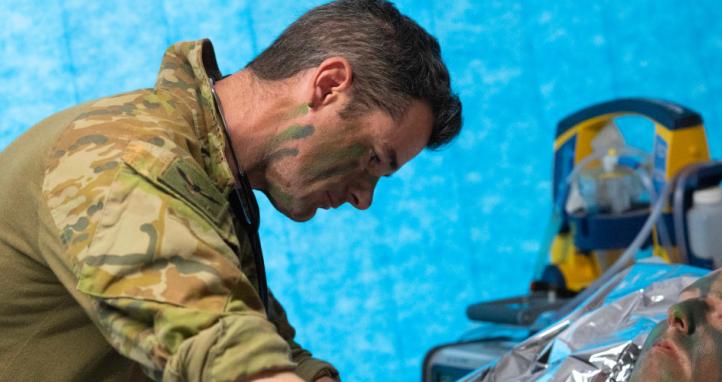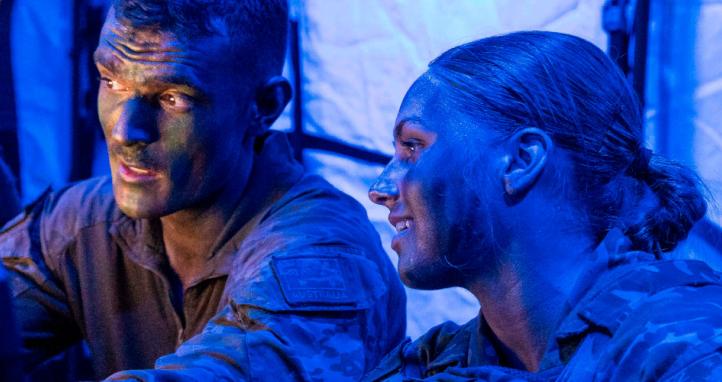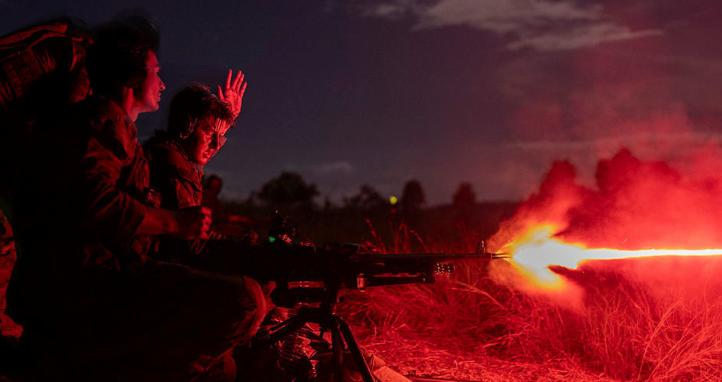The Australian Defence Force (ADF) is modernising rapidly. Emerging technologies and operating methods present a range of opportunities to significantly enhance capability. To ensure this modern force is appropriately sustained into the future, the ADF’s logistics capabilities cannot afford to be left behind.
The Army Logistic Training Centre Fiction Competition encouraged writers and multimedia artists to visualise the future of logistics in the 2025 – 2040 timeframe.
You can find Changi Airport at the end of the world, punctuating the earth like a concrete hyphen.
Here lies the gateway to Singapore. Here, at the earth’s edge, lies the junction of trackless Asia and the endless Pacific. Here, the Straits of Malacca close in tightly – as if curious about this entrepot of continents. The Straits leave Changi surrounded by shimmering silver, while black-bodied Indonesian islands – scattered like forgotten children’s toys – watch jealously from the horizon.
But where Changi’s hardpan once crowded with airliners, jostling for docking gates like pods of beached whales, there was now a glut of space. Where once the wide-body jets flew with bone-white skins they were today replaced by transports uniformed in grim-faced grey. Their flanks were daubed with off-tone black or charcoal lettering, each speaking mutely of an Anglophone Babel:
CANADA; ROYAL AIR FORCE; ROYAL AUSTRALIAN AIR FORCE; UNITED STATES AIR FORCE
The air here was thick with humidity; roaring with jets; alive with energy. A tent city bloomed around the air-conditioned luxury of the airport terminals, with Kevlar-canvas domes sprouting like mushrooms. Anonymous in this khaki agglomeration was a simple tent-office, where a young Royal Air Force logistician sweltered. For him, Singapore’s heat was alien and cloying. His cams were darkened with sweat, while his brow furrowed in concentration as he battled the smothering fug and the effects of jetlag.
'Sorry, Colonel,' he sighed, scratching at his stubbled jaw, 'the instructions are clear: no other urgent shipments jump the queue for the next ten inbound flights.'
Lately arrived and befuddled as he was, the logistician did not realise how brave it was to say those words. Across the desk from him stood Lieutenant-Colonel Lee Byron of the Royal Australian Artillery. He was dough-bellied, barrel-chested and bull-necked: a broad mass of weight and muscle. His demanding manner was already the stuff of legend, earning him the unflattering epithet ‘Lord Byron of Changi’.
Peering down at the logistician, Byron silently regarded the man as though his brain were par-boiled. At length, he spoke:
'No I will not bloody well wait,' he hissed. And he meant it. He really wouldn’t.
'Yes, you will,' the logistician replied, adding a hasty, 'sir.' Sleep deprivation had made him tetchy.
Byron leaned closer, eyes narrowed to a glower. He bared his teeth – only to be interrupted before he even spoke.
'Please note, Colonel: those inbound flights are needed to bring CANZUK units up to full complement.' It was Hogarth speaking, the AI assigned to support Changi’s immense logistics tail. “I have already inquired with Indo-Pacific Command; the Americans cannot release any of their flights, either.” The AI spoke through hidden speakers with the ethereal tone of all its kind, like some half-remembered voice from long ago.
'What good is it bringing more people here if we can’t bloody protect them?' Byron scowled. 'My battery just lost half its ammunition load.'
'What’s the problem?' the logistician asked, making a valiant effort to muster his energy.
Byron looked over his shoulder, jerking a thumb at a civilian behind him.
'Ask him.'
The civilian came forwards, carrying a scroll of e-paper and an apologetic look, crowned with hair like a brillo pad.
'It’s the Colonel’s air-defence missiles mate,' he said in a thin voice. 'Battery failure on the actuators. Mechanically they’re fine and they can launch no problem, but they won’t hit a thing.'
'So?' the logistician asked laconically. 'Just change the batteries.'
'It’s not like that. They’re volatile. Sealed inside finished units. We need to get the duds back to our build site and bring in replacements ASAP.'
'Point being,' Byron interjected, 'when the Hainan express arrives we won’t be shooting down many incoming missiles. So all those flights you’re bringing in? They’ll just be sitting targets.'
'Well, look, half the batch is fine…' the civilian ventured tentatively.
'Who are you?' the logistician asked, frowning.
'I work for the manufacturer. Assigned to help assure quality in the field.'
'Ah.'
'Enough nonsense,' Byron persisted, planting his palms on the desk, 'get me my damn missiles.'
Hogarth spoke up again through recessed speakers: 'Apologies, Colonel, but are we aware if there are even replacement units ready to fly out to us?' Byron turned to the representative from the manufacturer.
“Well?” he demanded, fists planted on his hips, “how soon can you get them here?”
The civilian quailed under Byron’s attention, unfurling the scroll of his e-paper urgently.
'Look, the build site is back in the UK. Let me make a call. I know the guy running their night-shift.'
***
It sat there, crowning a pallet. A grey-daubed monument of mute lethality; a bastard child of artisan skill and industrial lines. It was several feet long; broad as a torso; cylindrical but for the slipstream-trimmings of the motor housing. It was immobile like a stone – and agile enough to pierce a single window-frame, and then sunder the worlds inside. A drab yellow post-it note adorned its flank: Discuss with Rob.
'We can’t ship it,' Mike observed, sipping his coffee mug.
'Why?' Robert asked. He adjusted the glasses perched on his nose.
'It’s not safe.' Another laconic sip.
Robert cued a report on the smart-glasses display. Data jumped onto the frames.
'It got signed off by source inspection,' he noted, flicking through the report.
'Yep.'
'Is it the batteries? They’ve always been trouble.'
'Nope.' Mike sighed. His mug was empty. Bloody coffee rations.
Robert went deeper into the report with obsessive speed.
'It’s not the 3D-printed components, either.'
'Yep.'
Robert paused, worrying at his thin beard.
'The circuit boards. Did the supplier warn they were compromised?' Robert’s heart was heavy with dread. Enemy agents were filling the market with suspect chips. If they had to disassemble the unit…
'Nope.'
'What, then?' Robert gestured at the pallet. 'There’s tens of thousands in sales just sitting there.'
But more than sales were waiting. There were lives to be taken, cut short by fragmentation, or snuffed out by explosive overpressure. There were lives to be saved, by means of killing killers. Countless fates sat with the finished line-item on that pallet, and the drab yellow note on its side.
Mike gestured Robert to follow. He threw open a stores-room door. Flicked on a light. An empty shelf revealed itself, where specialised hardened plastic shipping crates should have waited.
'We can’t ship it,' Mike said for emphasis.
Robert cursed abruptly, responding to a display on his glasses – a call was coming in.
'It’s the bloody customer rep down in Singapore,' he hissed. 'What the hell am I telling them?'
Mike gave him a languid look. He pointed to the empty shelves for emphasis.
'Tell them that we can’t ship it.'
'Oh, shut up.' He answered the call, drumming up his best excuses.
***
Suffice to say, Byron was unimpressed by the excuses.
He stalked away from the tent in a fury, the glower on his face hiding his creeping doubt within. When the shooting started, lives would depend on his regiment of anti-aircraft and anti-missile specialists to keep the air-head safe. But he was already halfway bankrupt; his limited remaining stock would not be enough.
Arms swinging, he marched through loading yards where work gangs toiled at hauling supplies. The Americans among them were identifiable by their exo-skeletons, fuelled by mid-western tax dollars. The lesser-financed Britons and Australians laboured more traditionally, competing for the attention of an overworked fork-lift on the heavier loads. Byron scowled as he barged through, acutely aware the cornucopia around him included nothing he required most.
Another C-17 transport roared in overhead on vast wings, its turbines announcing arrival with a deafening shriek. Only the vibration of the e-paper in Byron’s fatigues made him aware he was receiving a call.
'Lieutenant-Colonel Byron here,' he bellowed over the jet engines, stepping aside from an exo-suited American with a fuel barrel in one hand.
'Colonel,' it was Hogarth, the AI. The curiously disembodied voice automatically boosted in volume, compensating for the background noise. 'I thought best to reassure you after our earlier discussion. I have verified that the fleet offshore has full munitions loads to perform anti-missile tasks.'
Byron paused, aware that the AI was performing a thousand other tasks – and yet had taken the time to reassure him about this one specific issue.
'Cheers, Hogarth.'
There was a full two seconds before the AI responded. Byron knew little about the mysterious workings of AIs – but he knew well enough that two seconds was a long time for their kind.
'Apologies, Colonel,' Hogarth continued. 'I suggest you get to your RHQ at once. Multiple ballistic tracks are inbound. The fleet is engaging, but some may get through.'
Byron swore. The Hainan express was arriving early.









